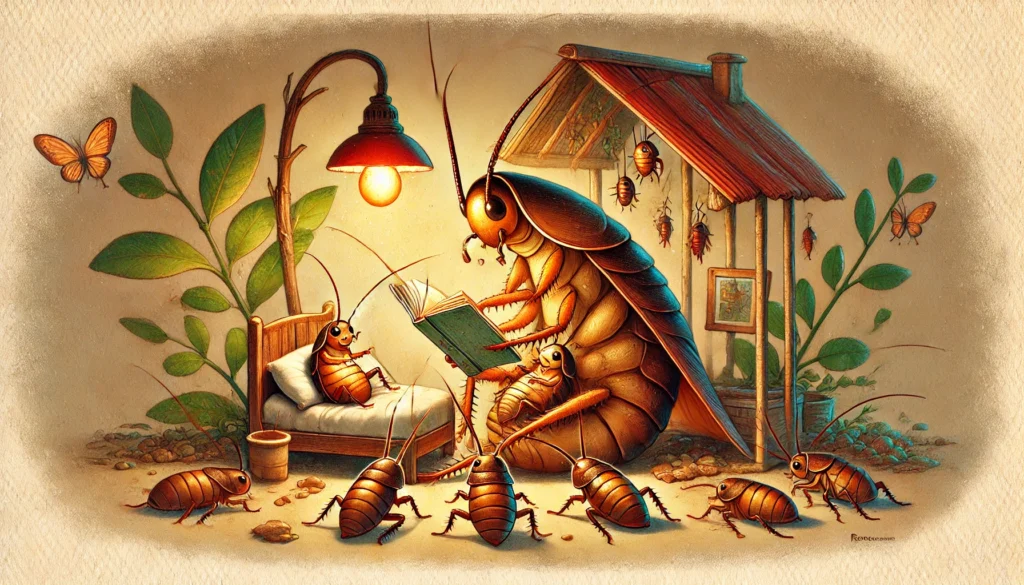
The Fear of Cockroaches: Katsaridaphobia
Katsaridaphobia, the fear of cockroaches, is a common anxiety disorder that affects many people worldwide. This intense and irrational fear can significantly impact daily life, causing distress and limiting activities. In this article, we’ll explore the symptoms, causes, and treatment options for katsaridaphobia, as well as provide practical tips for managing this fear. Additionally, we will also highlight some new positive ways of looking at cockroaches to help overcome the fear.
Understanding Katsaridaphobia
Katsaridaphobia is a specific phobia characterised by an overwhelming fear of cockroaches. While can be common to feel uneasy around these insects, individuals with katsaridaphobia experience extreme anxiety that can interfere with their quality of life in drastic ways.
Symptoms of Katsaridaphobia
People with katsaridaphobia may experience a range of emotional, cognitive, and physical symptoms when encountering cockroaches or even thinking about them:
- Intense fear and panic
- Anxiety attacks with symptoms such as a racing heart, difficulty breathing, sweating, and tremors
- Avoidance of places where cockroaches might be present
- Intrusive thoughts about cockroaches
- Physical symptoms such as nausea, dizziness, or fainting

Causes of Katsaridaphobia
The origins of katsaridaphobia can vary from person to person. Many people develop phobias in childhood but it can sometimes develop later on in life. Most animal phobias have a deeper root cause associated with it: being out of control. This is usually the true fear embodied by the animal. Some possible causes for a fear of cockroaches include:
- Traumatic experiences involving cockroaches. This can also be a perceived traumatic experience by a child. This means the child was not in any real danger but the sudden surprise encounter of the animal felt life-threatening or traumatic at the time.
- Learned behaviour from observing others’ reactions, particularly if a parent or other care giver shows fear around cockroaches.
- Genetic predisposition to anxiety disorders. Some people have mental health issues that make them more vulnerable to developing phobias.
- Cultural factors and societal attitudes towards cockroaches. Unfortunately, we are conditioned at a young age that cockroaches are only negative creatures.
Impact on Daily Life
Katsaridaphobia can significantly affect a person’s daily activities and overall well-being. Cockroaches, in many places, are abundant and therefore hard to avoid. It may lead to:
- Obsessive cleaning behaviours to prevent cockroach infestations
- Avoidance of certain places or situations including travel dentitions or visiting family
- Interference with work or social life
- Reduced quality of life due to constant anxiety and paranoia

Overcoming Fear With Fascination
One of the best ways to get over the fear of any animal is to learn how to appreciate them and find them fascinating. Additionally, building more compassion and understanding for them as living creatures worthy of life can help greatly. Cockroaches often evoke feelings of disgust, yet these ancient insects possess remarkable traits that contribute significantly to ecosystems worldwide. With over 4,500 species identified, only a small fraction are considered pests. The majority play essential roles in nutrient cycling and environmental balance.
Dispelling the Myths About Cockroaches
Cockroaches have long been misunderstood, often unfairly cast as dirty, disease-ridden pests. One of the most persistent myths is that all cockroaches are harmful or unsanitary. In reality, out of the thousands of cockroach species worldwide, only a small handful are associated with human habitats. Many species are clean, fascinating creatures that spend much of their time grooming themselves—much like cats. In fact, some species kept as pets, such as the Madagascar hissing cockroach, are completely harmless and pose no health risks. You can find out more here about just how amazing pets cockroaches can be!
Cockroaches are also very gentle animals that do not bite humans. They are shy and none aggressive animals.
Ancient Origins: Survivors Through the Ages
Cockroaches are among the oldest insects on Earth, with fossil records dating back approximately 320 million years to the Carboniferous period. This longevity showcases their incredible adaptability and resilience.
Their evolutionary success is attributed to their ability to thrive in diverse environments, from tropical forests to arid deserts. This adaptability has allowed them to endure multiple mass extinction events, including the one that eliminated the dinosaurs.

Remarkable Resilience: Survival Skills Unmatched
Cockroaches exhibit extraordinary survival abilities. Some species can live without food for up to a month and without water for a week.
Their respiratory system allows them to hold their breath for up to 40 minutes, aiding in underwater survival and reducing water loss.
Additionally, cockroaches can withstand radiation levels up to 15 times higher than humans, a trait that has intrigued scientists studying their potential in post-disaster environments.
Ecological Importance: Nature’s Decomposers
Beyond their resilience, cockroaches play a vital role in ecosystems as decomposers. They consume decaying organic matter, recycling nutrients back into the soil, which supports plant growth.
Their digestive systems, aided by symbiotic bacteria like Blattabacterium, efficiently process nitrogenous compounds, exemplifying a remarkable adaptation to nutrient-poor environments.
Social Behaviours: Complex, Cooperative, and Loving?
Cockroaches exhibit complex social behaviours. They communicate using pheromones and with some species even noises! The Madagascan Hissing Cockroach can make a hissing noise by pushing air through special tubes in its body. Cockroaches have also been observed making collective decisions, such as selecting optimal shelter sites together.
While cockroaches aren’t often associated with nurturing behaviour, several species are remarkably attentive mothers. Some, like the Pacific beetle cockroach (Diploptera punctata), are even considered among the most caring of all insects. This species gives birth to live young—a rare trait in the insect world—and nourishes them with a nutrient-rich “milk” produced inside her body.
Other species protect their oothecae (egg cases), carefully hiding them in safe environments or even carrying them until the young are ready to hatch. In some cases, mothers remain with their offspring after birth, offering protection and grooming them. Far from being cold and instinct-driven, these behaviours show that cockroaches are capable of complex parental care—another reason to see them in a different light.

Cognitive Abilities: Learning and Memory
Studies have shown that cockroaches also possess the ability to learn and remember. They can be trained to associate certain scents with food rewards, demonstrating classical conditioning.
This cognitive capability highlights their neurological complexity and challenges the perception of insects as simple, unfeeling, brainless organisms.
Treatment Options for Katsaridaphobia
Fortunately, there are effective treatments available for overcoming the fear of cockroaches. Here are some approaches that can help:
Cognitive Behavioural Therapy (CBT)
CBT is one of the most effective therapeutic approaches for treating specific phobias like katsaridaphobia. This therapy helps individuals identify and change irrational thoughts associated with cockroaches, developing strategies to cope with fear and anxiety. CBT helps people understand their brains and thoughts better and gives tools to start challenging and changing bad mental health habits.
Exposure Therapy
Gradual exposure to cockroach-related stimuli, under the guidance of a therapist, is a fundamental part of phobia treatment. Through controlled and systematic exposures, people can learn to face their fear and reduce associated anxiety. Unfortunately, the more rational part of our brain is not connected to our survival part of our brain. They can’t communicate so to change a fear, you must show not tell the survival part of your brain that cockroaches are not a threat. You can read more about the science of this here. Fortunately, the fear can change very quickly with some concentrated exposure therapy.
Relaxation Techniques
Practising relaxation techniques such as deep breathing, meditation, or yoga can be beneficial in reducing anxiety caused by the phobia. These techniques help calm the mind and body, promoting a state of tranquillity. When you feel scared, you want to send the right signals to your body. You want to get back into rest and digest instead of fight or flight. This means you might need to fake it until you make it. Force yourself to breath very slowly, relax all your muscles, put your shoulders back and open up your body into a strong confident pose. Then smile! It’s scientifically proven if you force yourself to act happy and brave, your body and feelings will start to then genuinely feel it.
Self-Help Strategies for Managing Katsaridaphobia
While professional help is often necessary, there are some self-help techniques that can complement treatment:
- Education: Learn about cockroaches and their behaviour to demystify them.
- Gradual self-exposure: Start with looking at pictures of cockroaches and gradually progress to more challenging situations.
- Practice relaxation techniques regularly to manage anxiety.
- Challenge negative thoughts about cockroaches with rational, fact-based thinking.
Seeking Professional Help
If katsaridaphobia is significantly impacting your life, it’s essential to seek help from a mental health professional. They can provide a proper diagnosis and develop a tailored treatment plan to help you overcome your fear. Fortunately, with the right help, the fear of cockroaches can be overcome very quickly, even as little as one session! So it is well worth seeking out support, there is no need to continue to suffer.
Conclusion: Freedom Is Possible!
Katsaridaphobia can be a challenging condition, but with the right approach and support, it is possible to overcome this fear. By combining professional treatment methods like CBT and exposure therapy with self-help strategies, individuals can learn to manage their anxiety and improve their quality of life.
Remember, you’re not alone in this struggle. Many people face similar fears, and there’s no shame in seeking help. With patience, persistence, and the right support, you can learn to overcome animal phobias in just one day and regain control over your life.
If you’re ready to take the first step towards overcoming your fear of cockroaches, consider exploring effective therapy for Katsaridaphobia with Creature Courage. Our neuroscience-based approach to treating insect fears has helped many individuals conquer their phobias and lead happier, more fulfilling lives.
Don’t let Katsaridaphobia hold you back any longer. Take action today, get in touch and discover how you can join the ranks of those who have successfully overcome their fears. Check out our real-life examples of conquering cockroach fear for inspiration, and if you have any common concerns about treating Katsaridaphobia, we’re here to address them and support you on your journey to freedom from fear.

Frequently Asked Questions
What is Katsaridaphobia? Katsaridaphobia is the intense and irrational fear of cockroaches. It’s a specific phobia that can cause significant anxiety and distress when encountering or even thinking about cockroaches.
How common is the fear of cockroaches? Approximately 1 in 10 people experience some degree of Katsaridaphobia, ranging from mild apprehension to severe aversion. This makes it a relatively common specific phobia.
What are the main symptoms of cockroach phobia? Common symptoms include intense fear, anxiety attacks, avoidance behaviours, intrusive thoughts about cockroaches, and physical reactions such as rapid heartbeat, sweating, and difficulty breathing when encountering or thinking about cockroaches.
What treatments are available for Katsaridaphobia? Effective treatments include cognitive behavioural therapy (CBT), gradual exposure therapy, and relaxation techniques. In some cases, medication may be prescribed to manage anxiety symptoms. Alternative treatments like hypnosis and mindfulness practices can also be helpful.
Can I overcome my fear of cockroaches on my own? While professional help is often recommended, some people can make progress using self-help techniques. These may include educating yourself about cockroaches, practicing relaxation methods, and gradually exposing yourself to cockroach-related stimuli. However, this can take much longer than working with a professional. For severe cases, it’s best to seek guidance from a mental health professional.


